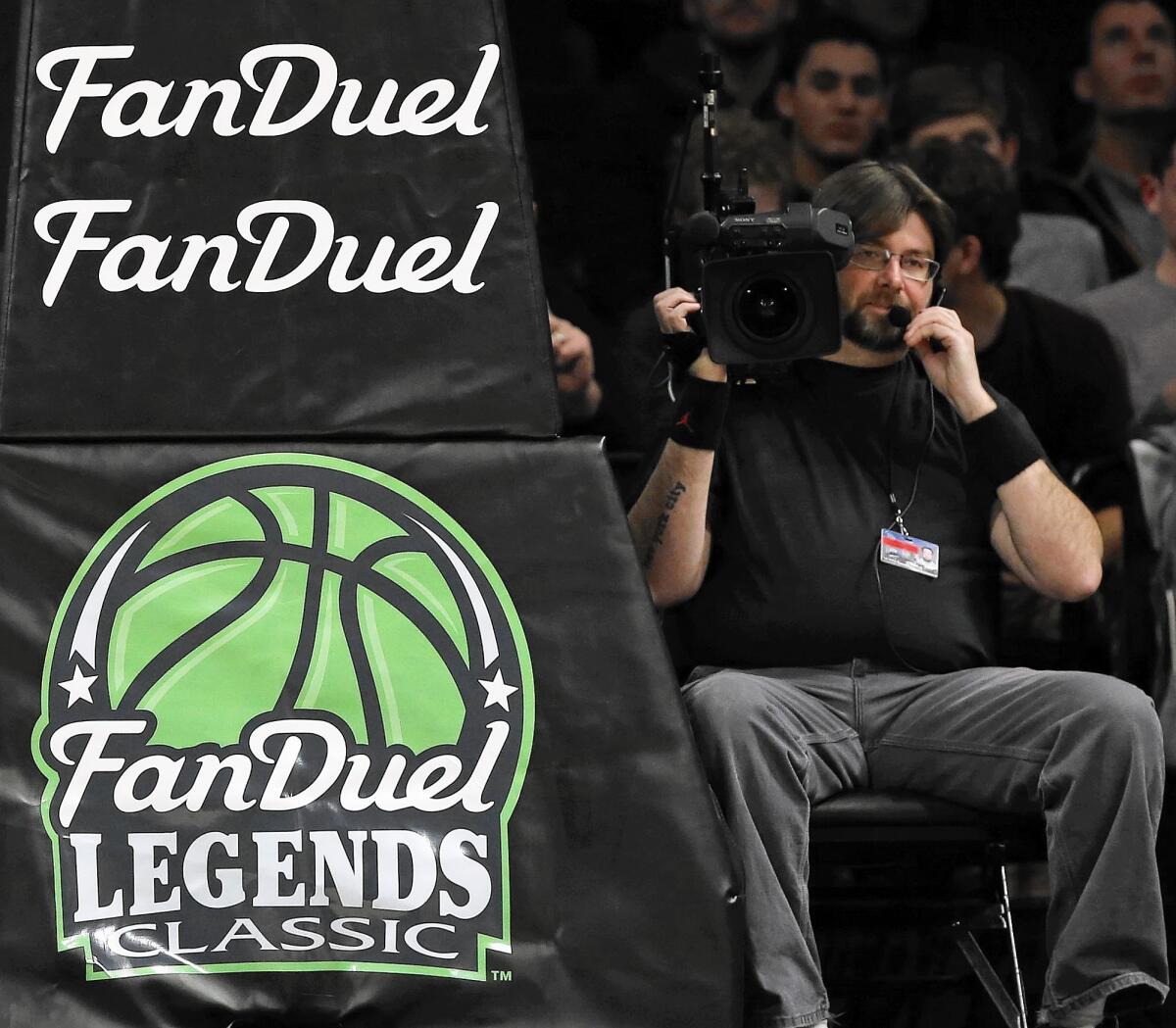As California considers licensing fantasy sports websites, experts warn of a major problem: gambling addiction

FanDuel advertising covers the post at the Barclays Center in New York.
As lawmakers consider licensing daily fantasy sports websites in California, compulsive bettors and those who treat them are warning that a new generation of problem gamblers is being created in the state.
Up to 1 million Californians already have a gambling problem, and existing treatment and education programs are reaching only a fraction of those people, officials say.
The problem may worsen as heavily marketed fantasy sports sites, including DraftKings and FanDuel, as well as Internet poker games separately being considered for licensing by the state, appeal to a younger, tech-savvy crowd new to wagering, experts warn.
“It’s very seductive,” said Yael Landa, director of the gambling treatment program at Beit T’Shuvah, a Los Angeles rehabilitation center for those struggling with addictions. “It’s very high-risk, but many people who play don’t understand that. A lot of people playing fantasy sports are in denial that what they are doing is gambling.”
Landa said the number of people seeking help from her program has doubled in the last year, creating a backlog of those seeking assistance, and the new intakes are more often younger than the usual gambler of 45 or older. “We’re getting a lot of youngsters in their 20s who are into fantasy-sports betting.”
Because California lacks sufficient programs to treat all those with problems, lawmakers should move cautiously and build safeguards into any sanctioned expansion of gambling in the state, advises Timothy Fong, co-director of the UCLA Gambling Studies Program.
“Whenever you have an expansion of gambling, you have an expansion of gambling addiction if you don’t have prevention and treatment programs in place,” said Fong, an associate clinical professor of psychiatry.
Other states have shut down fantasy sports sites, which allow players to pay to choose a lineup of real professional athletes for their fantasy football, baseball and basketball teams. The teams compete against other players’ fantasy teams for cash prizes based on statistics generated by the athletes’ real-game performance.
Daily fantasy sports websites have been deemed illegal gambling operations in New York, Texas, Illinois and Hawaii. In California, a bill allowing the websites has been approved by the Assembly and is being considered by the Senate. The bill must be acted on by the end of August.
One factor that could lead to more addiction is that Internet websites are easier to access than brick-and-mortar casinos that may require a long drive to reach, Fong said.
“There is something alluring about the ability to gamble 24 hours a day, seven days a week … on my mobile phone,” he said.
Also driving the market: In the last year, the firms have flooded television with flashy commercials promising riches. One FanDuel ad features Pasadena fantasy football player Scott Hanson, who brags in the commercial that he deposited only $35 and has won more than $2 million.
Hanson is the exception, according to recovering problem gamblers who have found fantasy sports addictive. They include a 31-year-old accountant named Hart, who asked that his last name not be used for fear of hurting his employability. He has sought treatment at Beit T’Shuvah after losing $100,000 in the last seven years to various forms of gambling.
“You are not going to be that guy” who wins $2 million, Hart said. “There are only a few guys like that and there are a million losers.” Hart said his fantasy NFL teams provided an escape from his daily problems. “When I am in a fantasy game, I’m not living in the pain of my outside life,” he said.
But losing brings depression and isolation, he said, noting he once lost $24,000 playing Internet blackjack in four hours.
Daily fantasy sports provides an adrenaline rush similar to that of other forms of gambling, said another recovering bettor, who asked to be identified only by his Internet handle, “49ersPride,” out of fear his situation would affect his reputation and job prospects.
The 24-year-old said there were months that he would lose up to $15,000 through a combination of sports bets through bookies and play on daily fantasy sports websites.
Eventually, he had to tell his parents about his addiction and his debt. He gave up an apartment in Brentwood to enter the Beit T’Shuvah rehab program seven months ago.
“It’s dangerous,” he said of Internet gambling. “Kids are already doing it anyway, but if you are licensing it and putting it out there it’s just going to hit a wider range of people.”
Industry officials deny their daily fantasy sports games are a form of gambling. They say that they are games of skill because players have to research the attributes of professional athletes to make informed decisions.
There are some fundamental differences between fantasy sports and gambling websites that offer online poker or roulette that make it less likely for the former to lead to problems, according to Peter Schoenke, chairman of the Fantasy Sports Trade Assn.
Someone playing Internet poker can quickly place bets, one after another, while fantasy-sports enthusiasts have to take time to research individual players and there is one game a day for each sport, he said.
Still, the industry is open to proposals by legislators to reduce problem gaming in the various states considering the licensing of the games, Schoenke said. He noted that some sites have information on where people can get help if they have a problem.
“We as an industry are certainly cognizant of problem gamers and try to address them head on,” he said.
The state Office of Problem Gambling receives $8.4 million annually, most of it mandated from Native American tribes operating casinos, to provide education and treatment services aimed at problem gamblers, said Terri Sue Canale-Dalman, chief of the office. The daily fantasy sports industry makes no contributions.
About 2,000 people receive treatment from the office each year, a fraction of the 1 million Californians believed to have gambling problems.
A 2006 study by the state office indicated that 1 in 5 problem gamblers were aware of the hotline 1-800-GAMBLER and that better outreach might get 15,000 gamblers to seek treatment annually.
The office, Canale-Dalman said, is “analyzing its outreach to determine how we can increase the number of people seeking treatment.”
Join the conversation on Facebook >>
Assemblyman Adam Gray (D-Merced) said his legislation would help in that effort, by allocating a portion of the fees paid by the licensed websites to problem-gambling treatment and education programs. The amount would be determined by the state Department of Justice.
“To the extent my legislation can provide additional resources, to increase the money available is a good thing,” Gray said.
The bill would also require the websites to include information on how compulsive gamers can get help, prohibit them from extending credit to players and mandate that a form be provided that would allow those with problems to exclude themselves from future play.
“To say we ought to just ban everything is just to stick your head in the sand, because [fantasy sports] is going on in California,” Gray said. “Why not have a legal, regulated and safe option for people to engage in? I think that’s the responsible thing to do.”
Twitter: @mcgreevy99
ALSO
Apple vs. FBI: Battle over unlocking phone gets nastier
The presidential race is so awful you can’t look away
Hundreds gather in downtown L.A. to support convicted New York cop Peter Liang
More to Read
Start your day right
Sign up for Essential California for news, features and recommendations from the L.A. Times and beyond in your inbox six days a week.
You may occasionally receive promotional content from the Los Angeles Times.







